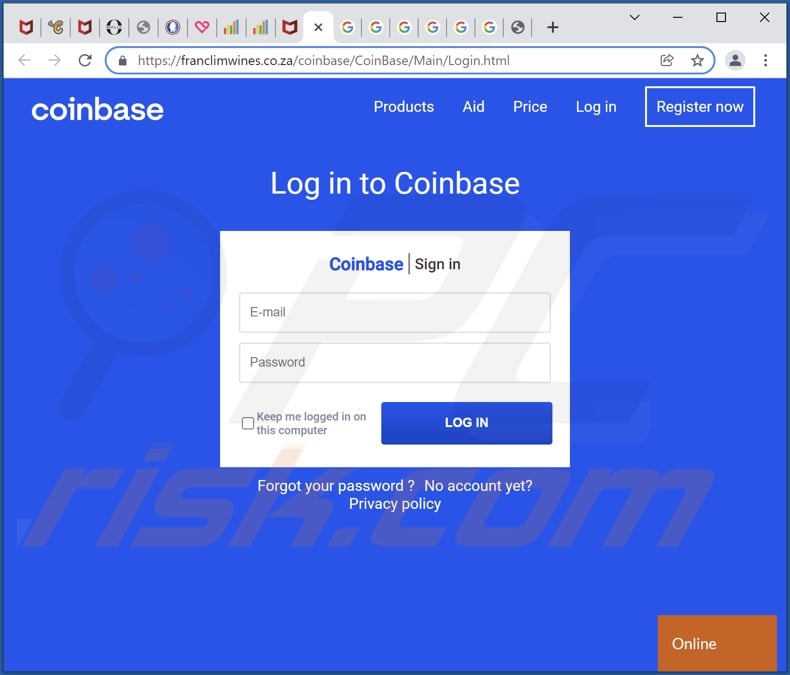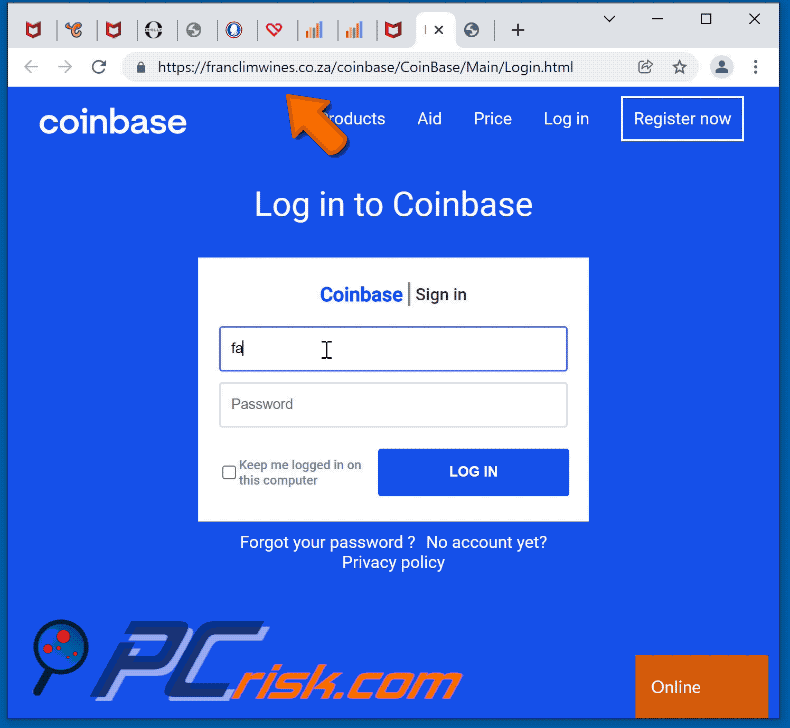Get free scan and check if your device is infected.
Remove it nowTo use full-featured product, you have to purchase a license for Combo Cleaner. Seven days free trial available. Combo Cleaner is owned and operated by RCS LT, the parent company of PCRisk.com.
What is the "Coinbase" scam?
The "Coinbase" scam is classified as phishing. It is presented as the sign-in page of Coinbase - the cryptocurrency exchange platform offering various crypto-related services. Attempts to log in through these phishing sites can result in Coinbase account theft and other serious issues.

"Coinbase" scam overview
When our researchers accessed the fake "Coinbase" log-in webpage, it appeared quite similar to the genuine one. At the time of research, the legitimate sign-in page used a similar shade of blue for the background, but the fonts and layout were different.
Like with the real Coinbase webpage, users could sign into their accounts with their password and the email used to register it. Once we attempted to log in using fake credentials, it garnered no response until the "Keep me logged in on this computer" checkbox was selected.
Then the phishing site asked to provide the "correct informations", which it would have requested regardless of the log-in credential legitimacy.
Afterward, the page encouraged users to confirm their information by providing their full name, phone number, addresses, and SSN (Social Security Number - a unique nine-digit number assigned to US citizens/ semi-permanent residents).
Therefore, these phishing websites target not only Coinbase account usernames/passwords but also their users' personally identifiable information. To summarize, trusting this scam can result in Coinbase account theft, cryptocurrency-related financial losses, and identity theft.
| Name | Coinbase scam website |
| Threat Type | Phishing, Scam, Social Engineering, Fraud |
| Disguise | Scam webpage is disguised as the Coinbase sign-in page. |
| Related Domains | franclimwines.co[.]za |
| Detection Names (franclimwines.co[.]za) | Combo Cleaner (Malware), CRDF (Malicious), Fortinet (Phishing), G-Data (Malware), Webroot (Malicious), Full List Of Detections (VirusTotal) |
| Distribution methods | Compromised websites, rogue online pop-up ads, potentially unwanted applications. |
| Damage | Loss of sensitive private information, monetary loss, identity theft, possible malware infections. |
| Malware Removal (Windows) |
To eliminate possible malware infections, scan your computer with legitimate antivirus software. Our security researchers recommend using Combo Cleaner. Download Combo CleanerTo use full-featured product, you have to purchase a license for Combo Cleaner. 7 days free trial available. Combo Cleaner is owned and operated by RCS LT, the parent company of PCRisk.com. |
Cryptocurrency-themed scam examples
The Internet is rife with misleading, deceptive, and malicious content. Cryptocurrency-centered scams are gaining popularity, as are the digital currencies themselves.
We have analyzed many of these schemes, including those that target cryptowallet log-in credentials (e.g., "Wallet Access Connect", "METAMASK scam", "Phantom Wallet Recovery", etc.) and fake cryptocurrency giveaways (e.g., "NASA ETH and BTC Giveaway", "UFO giveaway", "Polkadot giveaway", etc.).
How did I open a scam website?
We encountered this illegitimate "Coinbase" page when reviewing browser notification spam, yet this is by far not the only way of accessing such websites.
Users can get redirected to them by visiting or interacting with (e.g., clicking ads, buttons, etc. on) sites that use rogue advertising networks. Mistyping a URL may also result in entry to a scam-running page. Adware can promote scam webpages via the advertisements it displays. Some adware-types can make a browser force-open deceptive sites.
How to avoid visiting scam websites?
Exercising caution when browsing can ensure computer safety. Since suspicious/malicious websites are often accessed via those using rogue advertising networks - we advise avoiding Torrenting, illegal streaming/downloading, and other sites that offer dubious services/content.
Ignore or decline (i.e., press "Block", "Block Notifications", etc.) on notification requests presented by untrustworthy webpages, as these notifications/advertisements are known to endorse scams.
Adware can promote deceptive websites through its adverts or by force-opening them. Therefore, to avoid allowing this software into your system - download only from official/verified sources and approach installation processes with care (e.g., read terms, use "Custom/Advanced" settings, opt-out of additions, etc.).
We must emphasize the importance of having a dependable anti-virus installed and kept updated. Security programs must be used to run regular system scans and to remove threats/issues. If your computer is already infected, we recommend running a scan with Combo Cleaner Antivirus for Windows to automatically eliminate all threats.
The appearance of "Coinbase" pop-up scam (GIF):

Instant automatic malware removal:
Manual threat removal might be a lengthy and complicated process that requires advanced IT skills. Combo Cleaner is a professional automatic malware removal tool that is recommended to get rid of malware. Download it by clicking the button below:
DOWNLOAD Combo CleanerBy downloading any software listed on this website you agree to our Privacy Policy and Terms of Use. To use full-featured product, you have to purchase a license for Combo Cleaner. 7 days free trial available. Combo Cleaner is owned and operated by RCS LT, the parent company of PCRisk.com.
Quick menu:
- What is Coinbase scam website?
- How to identify a pop-up scam?
- How do pop-up scams work?
- How to remove fake pop-ups?
- How to prevent fake pop-ups?
- What to do if you fell for a pop-up scam?
How to identify a pop-up scam?
Pop-up windows with various fake messages are a common type of lures cybercriminals use. They collect sensitive personal data, trick Internet users into calling fake tech support numbers, subscribe to useless online services, invest in shady cryptocurrency schemes, etc.
While in the majority of cases these pop-ups don't infect users' devices with malware, they can cause direct monetary loss or could result in identity theft.
Cybercriminals strive to create their rogue pop-up windows to look trustworthy, however, scams typically have the following characteristics:
- Spelling mistakes and non-professional images - Closely inspect the information displayed in a pop-up. Spelling mistakes and unprofessional images could be a sign of a scam.
- Sense of urgency - Countdown timer with a couple of minutes on it, asking you to enter your personal information or subscribe to some online service.
- Statements that you won something - If you haven't participated in a lottery, online competition, etc., and you see a pop-up window stating that you won.
- Computer or mobile device scan - A pop-up window that scans your device and informs of detected issues - is undoubtedly a scam; webpages cannot perform such actions.
- Exclusivity - Pop-up windows stating that only you are given secret access to a financial scheme that can quickly make you rich.
Example of a pop-up scam:

How do pop-up scams work?
Cybercriminals and deceptive marketers usually use various advertising networks, search engine poisoning techniques, and shady websites to generate traffic to their pop-ups. Users land on their online lures after clicking on fake download buttons, using a torrent website, or simply clicking on an Internet search engine result.
Based on users' location and device information, they are presented with a scam pop-up. Lures presented in such pop-ups range from get-rich-quick schemes to fake virus scans.
How to remove fake pop-ups?
In most cases, pop-up scams do not infect users' devices with malware. If you encountered a scam pop-up, simply closing it should be enough. In some cases scam, pop-ups may be hard to close; in such cases - close your Internet browser and restart it.
In extremely rare cases, you might need to reset your Internet browser. For this, use our instructions explaining how to reset Internet browser settings.
How to prevent fake pop-ups?
To prevent seeing pop-up scams, you should visit only reputable websites. Torrent, Crack, free online movie streaming, YouTube video download, and other websites of similar reputation commonly redirect Internet users to pop-up scams.
To minimize the risk of encountering pop-up scams, you should keep your Internet browsers up-to-date and use reputable anti-malware application. For this purpose, we recommend Combo Cleaner Antivirus for Windows.
What to do if you fell for a pop-up scam?
This depends on the type of scam that you fell for. Most commonly, pop-up scams try to trick users into sending money, giving away personal information, or giving access to one's device.
- If you sent money to scammers: You should contact your financial institution and explain that you were scammed. If informed promptly, there's a chance to get your money back.
- If you gave away your personal information: You should change your passwords and enable two-factor authentication in all online services that you use. Visit Federal Trade Commission to report identity theft and get personalized recovery steps.
- If you let scammers connect to your device: You should scan your computer with reputable anti-malware (we recommend Combo Cleaner Antivirus for Windows) - cyber criminals could have planted trojans, keyloggers, and other malware, don't use your computer until removing possible threats.
- Help other Internet users: report Internet scams to Federal Trade Commission.
Frequently Asked Questions (FAQ)
What is a pop-up scam?
Pop-up scams are deceptive messages designed to entice/scare users into performing specific actions, e.g., disclosing private data, making bogus transactions, calling fake helplines, downloading files, installing software, etc.
What is the purpose of a pop-up scam?
Pop-up scams are practically always used just to generate revenue for their designers. How scammers profit depends on the scam model they're using, e.g., abusing or selling personal information, obtaining funds through deception, promoting (likely unreliable/harmful) applications, spreading malware, and so on.
I have provided my personal information when tricked by a scam, what should I do?
If you have disclosed log-in credentials - immediately change them (i.e., passwords, passphrases, etc.) on all potentially compromised accounts and contact their official support. And if you have provided other personal information (e.g., ID card details, credit card numbers, etc.) - contact relevant authorities without delay.
Why do I encounter fake pop-ups?
Pop-up scams are run on sites that seldom receive direct visitors. In other words, most users enter them via mistyped URLs or redirects caused by webpages using rogue advertising networks, deceptive browser notifications/ intrusive ads, or installed adware.
Will Combo Cleaner protect me from pop-up scams?
Combo Cleaner is designed to scan visited websites and to detect deceptive/malicious pages (including those that promote scams). Therefore, you will receive immediate warning, and access to the suspicious webpage will be restricted.
Share:

Tomas Meskauskas
Expert security researcher, professional malware analyst
I am passionate about computer security and technology. I have an experience of over 10 years working in various companies related to computer technical issue solving and Internet security. I have been working as an author and editor for pcrisk.com since 2010. Follow me on Twitter and LinkedIn to stay informed about the latest online security threats.
PCrisk security portal is brought by a company RCS LT.
Joined forces of security researchers help educate computer users about the latest online security threats. More information about the company RCS LT.
Our malware removal guides are free. However, if you want to support us you can send us a donation.
DonatePCrisk security portal is brought by a company RCS LT.
Joined forces of security researchers help educate computer users about the latest online security threats. More information about the company RCS LT.
Our malware removal guides are free. However, if you want to support us you can send us a donation.
Donate
▼ Show Discussion